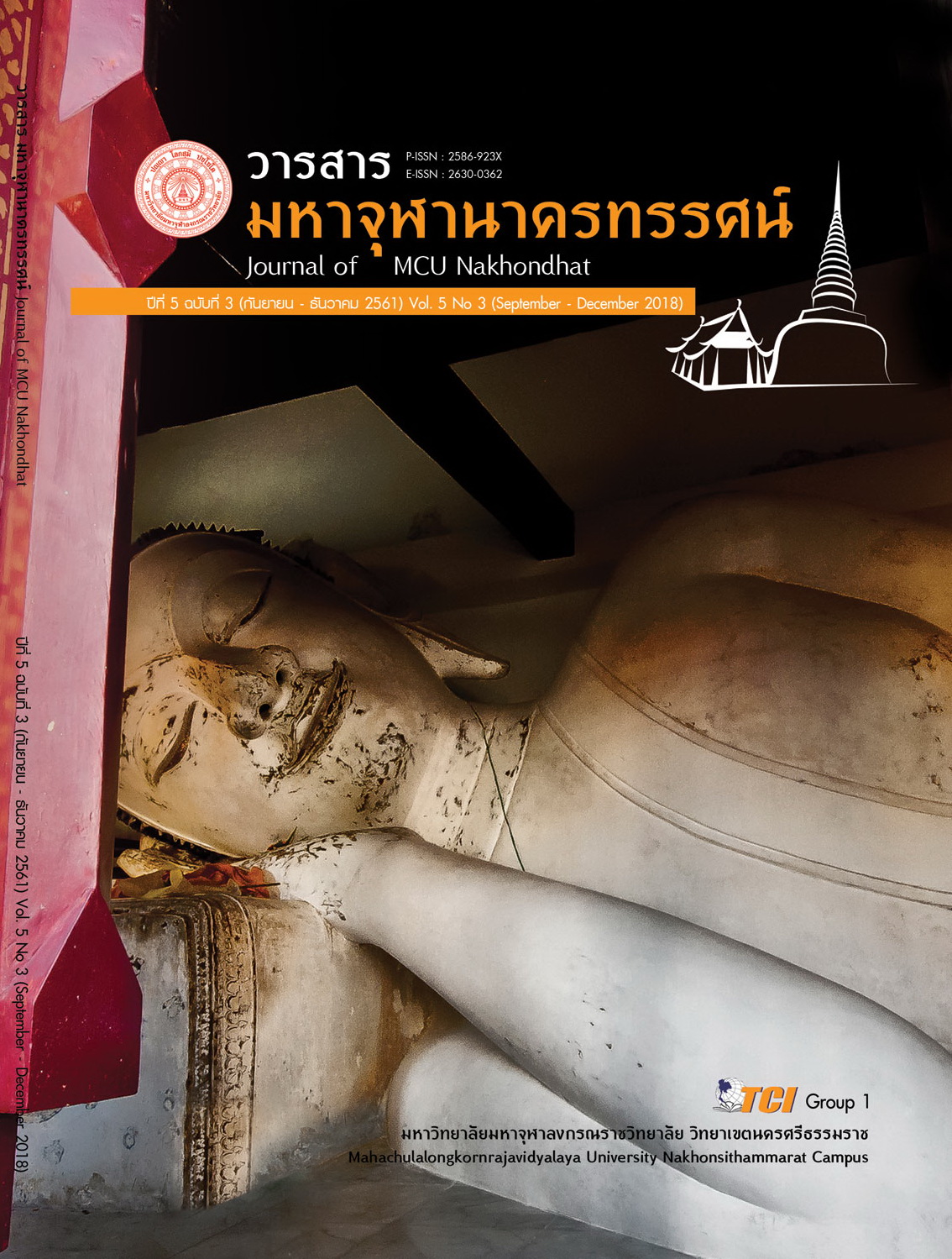GOOD GOVERNANCE IN THE SANGKHA ACTS TO SUPPORT THE SANGKHA ADMINISTRATION.
Main Article Content
Abstract
The objectives of this research were as follows 1) to study and explain of Good Governance to Law glergy in 1962. 2) To study the state of applying of Good governance according to Law glergy in 1962 and Law glergy (No.2) 1992 which can be worked of Sangha. 3) To suggest and improve Law glergy 1962 and Law glergy (No 2.) 1992 from 46 key informants, i.e. Lawer group 10 persons, Politician group 10 persons, Buddhist scholars 16 persons, Buddhist lays 10 persons by in-depth interview.
The findings were as follows;-
- The Appearance to the good governance that exist in the law clergy in year 1962 such as Rule of law identified Majesty cardinal by the most senior priest is entitled to the founding patriarch. Contrary to the custom of clergy because respect clergy as well as holding senior years.Therefore, all the clergy of the law should be turned over by the senior traditional years because of the lack of moral in the appointment of the Buddhist Monks. Although seized property, but it has to be a major contributor to consider over the properties.Lack of Transparency because there is no clarity about the ordinances of the temple treasure. The law should provide clear audit committee of the annual measurement of assets and audit results revealed. The lack of participation the activities are not based on any involvement of stakeholders. Lack of responsibilities dealing with offenders (Buddhist monks and novices) Not immediate and decisively.The valueable in the law clergy has main value is reasonable such as Land use is abandoned and at the monk geosciences have the most benefit, and if the government will take him to the temple permanently it must be charges.
- The use of good governance that exist in the law clergy in year 1962 and the law clergy (No.2) year 1992 it can promote the implementation of the clergy such as governance the abbot has the obligation to be taken of the key elements of the sangha; - aspect, educational aspect, welfare aspect, Dhamma preaching aspect, public service aspect, and social welfare aspect which are enhanced to many affaire for public and people.
3. Suggestions for improvementof the law clergy in year 1962 and the law clergy (No.2) year 1992 such as improvement of law (1) Clergy should be ruled by clergyby refusing to give into the dark some direction. (2) Board Ecclesiastical or Sangha AssociationIn the selection of individuals to serve it. Should follow the principles of good governance but use the senior came into the combines. Improvement of structure, parent’s clergy Higher than the abbot should be is doomed throughout the Sangha Association. Dependent attributes at the age of seventy years as aonly the abbot. Improvement of format, preceptor should be respond more than this, if default be deemed so infringe and must caution, stop working temporarily or out of duty.
Article Details
References
พระครูพินิตสุตาคม (สมพงษ์ สุตาคโม). (2555). การบริหารจัดการของเจ้าอาวาสวัดในเขตการปกครองคณะสงฆ์ อำเภอแพงแสน จังหวัดนครปฐม. มหาวิทยาลัยมหาจุฬาลงกรณราชวิทยาลัย: วิทยานิพนธ์พุทธศาสตรมหาบัณฑิต, (บัณฑิตวิทยาลัย ).
พระครูสังฆรักษ์ทรงพรรณ ชยทตฺโต (ภิรมย์พร). (2554). การประยุกต์ใช้หลักธรรมาภิบาลในการบริหารกิจการคณะสงฆ์ของพระธรรมปริยัติเวที (สุเทพ ผุสฺสธมฺโม). วิทยานิพนธ์พุทธศาสตรมหาบัณฑิต: บัณฑิตวิทยาลัย : มหาวิทยาลัยมหาจุฬาลงกรณราชวิทยาลัย.
พระเมธีธรรมาภรณ์ (ประยูร ธมฺมจิตฺโต). (2539). การปกครองคณะสงฆ์ไทย, พิมพ์ครั้งที่ 9 . กรุงเทพมหานคร: มูลนิธิพุทธธรรม.
พระศรีปริยัติโมลี (สมชัย กุสลจิตฺโต). (2545). สงฆ์กับการเมือง. กรุงเทพมหานคร: มหาจุฬาลงกรณราชวิทยาลัย.
มหาจุฬาลงกรณราชวิทยาลัย . (2539). พระไตรปิฎกฉบับภาษาไทย ฉบับมหาจุฬาลงกรณราชวิทยาลัย. กรุงเทพมหานคร: โรงพิมพ์มหาจุฬาลงกรณราชวิทยาลัย.
ร่มปรางศ์ สวมประคำ. (2548). “ผลกระทบของรัฐธรรมนูญแห่งราชอาณาจักไทย พุทธศักราช 2540 ที่มีต่อพระราชบัญญัติคณะสงฆ์ พ.ศ. 2505 และพระราชบัญญัติคณะสงฆ์ (ฉบับที่ 2) พ.ศ. 2535. บัณฑิตวิทยาลัย มหาวิทยาลัยมหาจุฬาลงกรณราชวิทยาลัย: วิทยานิพนธ์พุทธศาสตรมหาบัณฑิต สาขาพุทธศาสตร.
Burgess, R.G. (1988). Conversations with a Purpose; the ethnographic interview in educational research'. in R.G. Burgess (ed.): Qualitative Methodology.


